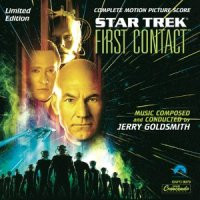- Composed by Jerry Goldsmith
- GNP Crescendo / 2012 / 79:13
By far the best and by far the most successful of the Captain Picard-era Star Trek films, First Contact sees the crew of the Enterprise travelling back in time to stop Bjorn Borg preventing the first contact between mankind and the Vulcans. It’s a good film, with a nice dose of humour, some fine action scenes and Patrick Stewart’s finest performance as Picard. It also marked the return to the franchise (after a two-film absence) of Jerry Goldsmith, for the third of his five Star Trek film scores. Because his work on another film overran, the composer needed someone else to write about a third of the score and he turned to his son Joel, a good film composer in his own right, for those passages.
This album presents the complete score for the first time. It opens with its most distinguished feature, its beautifully majestic main theme, one of the most memorable creations of Goldsmith’s final years. Despite his protestations to the contrary, the composer really did “get” Star Trek, and his main theme here – a moving piece representing that first contact with the Vulcans – is a case in point. It’s hymnal, reverent, full of awe and wonder. He uses it sparingly – after the main title, it features in the beautiful “Welcome Aboard” midway through the score and then (very brief hints of it aside) not again until “First Contact” itself, the stunning finale which must surely rank as the most moving musical moment in any of the Star Trek films.
Needless to say, the composer did revisit some of his themes from earlier scores – turning his Klingon theme into a kind of heroic fanfare for Worf is perhaps not really in keeping with its original intention, but musically it works a treat. The classic march from Star Trek: The Motion Picture is heard in a few cues – and of course heard in full over the end titles – but the other theme to make an appearance is more surprising, with the four-note “barrier motif” from Star Trek V used as a kind of bridging musical glue all over the score (and it would perform a similar role in the composer’s final two scores in the franchise).
The other main idea is the clanging, metallic music for the Borg, including a four-note theme often performed by keyboard. This leads Goldsmith to create some very tight action music – “Red Alert”, “Temporal Wake”, “Fully Functional” – cues which are certainly amongst the score’s most enjoyable. Towards the end, the lengthy “The Dish” is a classic piece of Goldsmith action/suspense (similar to some of the music in The Edge, written around the same time).
Joel Goldsmith’s music for the film is mostly for the Borg sections, and the great thing is that it is no less accomplished than his father’s. “Retreat” in particular is a fantastic piece of music, focused and menacing and exciting. In fact, the highlight of the previously-unreleased cues comes from the younger Goldsmith, the terrific “Flight of the Phoenix”. Full of heroism, adventure, excitement, it really is a fantastic piece of music, the composer cleverly working in his father’s march theme and generally approximating his sound in an uncanny way. It always seemed to be a puzzling omission from the original album, fortunately one which can now be put right.
This score – main theme apart – perhaps doesn’t have the individual highlights of Goldsmith’s first two in the franchise, but it’s a very consistent listen and makes for a fine album. “Flight of the Phoenix” is a wonderful addition – perhaps the rest of the previously-unreleased music doesn’t add that much, but neither does it take anything away, and the score plays well at 75 minutes. GNP Crescendo’s new album corrects some of the flaws in the sound of their original release and also features detailed liner notes (including a lengthy track-by-track analysis available online). ****













Thanks for the review James. I wanted to know if this would be worth picking up. I have the original release and I am pretty happy with it. Sounds like new material adds to the experience.
Roman: I think it is worth picking up. Many of the added cues, as James says, neither really add nor detract from the presentation, but the few big highlights added represent a major improvement.
It’s really too bad that this release of one of Joel Goldsmith’s biggest cinema scores had to come practically on top of news of his very premature death.